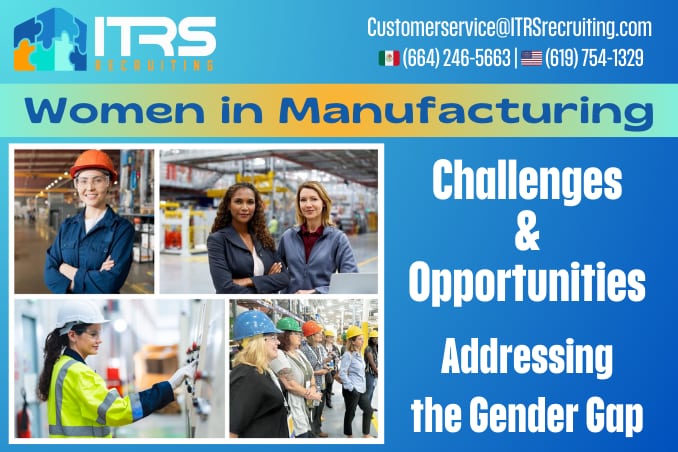Challenges and Opportunities for Women in Manufacturing: Addressing the Gender Gap and Promoting Inclusivity

Manufacturing, traditionally dominated by men, has long presented challenges for women seeking to enter and advance in the industry. Despite significant progress over the years, the gender gap remains a pervasive issue. However, with increased awareness and concerted efforts from companies, there are emerging opportunities that are reshaping the landscape for women in manufacturing.
** The Gender Gap in Manufacturing
The gender gap in manufacturing is a multifaceted issue. Women represent only a fraction of the workforce, and this underrepresentation is particularly pronounced in technical roles and leadership positions. Cultural stereotypes, a lack of female role models, and inadequate support for work-life balance are among the barriers that have historically hindered women’s participation in this sector.
In many cases, the industry’s male-centric culture can create environments that are unwelcoming or even hostile to women. Reports of gender bias, unequal pay, and limited opportunities for career advancement are not uncommon. Furthermore, the physical demands of certain manufacturing jobs, coupled with outdated perceptions about women’s capabilities, have perpetuated the belief that these roles are unsuitable for women.
** Opportunities for Women in Manufacturing
Despite these challenges, the landscape is gradually changing, with more companies recognizing the value of diversity and inclusion. The push for gender parity is not just a moral imperative but also a business one. Studies have consistently shown that diverse teams drive better decision-making, foster innovation, and contribute to improved financial performance.
One significant opportunity lies in the growing demand for skilled labor in manufacturing. As the industry evolves with the adoption of new technologies, there is a pressing need for a more diverse talent pool. Women, with their unique perspectives and skill sets, are well-positioned to fill this gap. Furthermore, the rise of automation and advanced manufacturing techniques is creating roles that are less physically demanding, making them more accessible to women.
** Companies Leading the Way in Inclusivity
Several forward-thinking companies are taking proactive steps to address the gender gap in manufacturing and promote inclusivity.
1. General Motors (GM): GM has been a trailblazer in promoting gender diversity within the manufacturing sector. The company has not only made headlines with Mary Barra’s appointment as CEO, but it has also implemented robust policies to support women in the workforce. GM offers mentorship programs, leadership training, and flexible work arrangements, all aimed at empowering women to advance in their careers.
2. Siemens: Siemens is another company making significant strides in fostering gender diversity. The company has launched several initiatives, including its Women in Manufacturing program, which provides resources and support for women pursuing careers in the industry. Siemens also focuses on creating an inclusive work environment by promoting gender equality in hiring practices and offering comprehensive maternity and paternity leave.
3. 3M: 3M has taken a holistic approach to inclusivity by addressing the challenges women face at multiple levels. The company has established networks and forums for women in manufacturing, providing opportunities for networking, mentorship, and professional development. Additionally, 3M is committed to closing the gender pay gap and has implemented policies to ensure equal pay for equal work.
4. Bosch: Bosch has been recognized for its efforts to promote gender diversity through its “Diversity & Inclusion” strategy. The company has set ambitious targets for increasing the representation of women in leadership roles and offers targeted development programs to help women advance in their careers. Bosch also emphasizes work-life balance, offering flexible work options and comprehensive support for working parents.
**Conclusion
While the gender gap in manufacturing remains a significant challenge, there are encouraging signs of progress. The increasing recognition of the importance of diversity and inclusion, coupled with the proactive efforts of leading companies, is creating new opportunities for women in the industry. By continuing to address the barriers that have historically excluded women from manufacturing, the industry can unlock the full potential of its workforce and pave the way for a more inclusive and innovative future.
